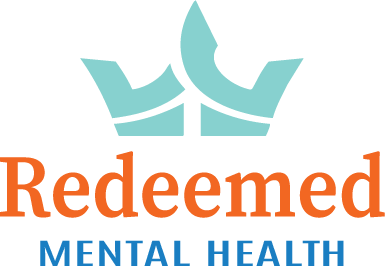Support, Stability, and a Fresh Start After Prison
Rebuilding your life after prison takes more than motivation — it takes real support. Whether you’ve been in a local jail, state prison, or federal prison, adjusting to life on the outside can bring up anxiety, depression, past trauma, or substance abuse challenges. That’s where reentry therapy comes in.
At Redeemed Mental Health, we provide evidence-based mental health services to help people reentering society after incarceration. Under the leadership of Dr. Andrea Wagner, a clinical psychologist with experience in the criminal justice system, our program is designed for formerly incarcerated individuals who want to stay grounded, reconnect with family, and build a stable future.
If you or someone you love is navigating reentry after prison, here’s what you need to know about getting help — and how to find therapy that works.

What Is Reentry Therapy?
Reentry therapy is a form of behavioral health care that helps people adjust to life after incarceration. It focuses on managing mental health issues, processing trauma, preventing relapse, and learning how to function in a fast-moving world that may look very different than it did before prison.
Reentry therapy at Redeemed Mental Health may include:
Individual counseling and talk therapy
Substance abuse support and relapse prevention
Case management and coordination with reentry programs
Trauma-informed care for PTSD, anxiety, or depression
Connection to employment, training, and workforce development resources
Support for family members and reconnection with loved ones
Why Reentry Therapy Matters
People leaving prison face some of the steepest challenges when it comes to mental health. Long sentences, mass incarceration, and limited access to mental health services behind bars can leave formerly incarcerated individuals at a higher risk of depression, substance use, or hopelessness.
At Redeemed, we know that successful reentry isn’t just about staying out of trouble — it’s about improving outcomes for individuals, families, and the community. Investing in quality care improves public safety, reduces recidivism, and gives people the tools they need to move forward with dignity and direction.

Where to Start: Finding Reentry Services in California
1. Contact a Mental Health Provider That Understands Reentry
Not all therapists are trained to understand justice involvement or the realities of prison life. At Redeemed Mental Health, our team includes clinicians with background in criminal justice, substance abuse, and trauma-informed care. We also coordinate with reentry services and community organizations to make sure you’re supported beyond therapy.
2. Ask About Programs for Formerly Incarcerated People
We can work with with community programs, transitional housing, and parole/probation officers to support clients during reentry. If you need referrals for employment, housing, or legal resources, we’ll help connect you to the right networks.
3. Check Insurance or Sliding Scale Options
Many formerly incarcerated people may not have access to steady income or insurance right away. Redeemed Mental Health accepts most health insurance plans and can help explain what’s covered. If you’re uninsured, we may offer cash-pay or sliding scale options to help you get started.
We also work closely with local agencies and the Mental Health Services Administration guidelines to ensure you’re connected to any additional services you qualify for.
Who Reentry Therapy Helps
We work with:
Former prisoners transitioning back into community life
People recently released from state and federal prisons or local jails
Clients referred from probation, parole, or other reentry programs
Veterans, tradespeople, and others rebuilding their careers post-release
Individuals seeking support for mental illness, addiction, trauma, or anxiety
Whether you’re looking for reentry therapy for yourself or a loved one, know that help exists — and it’s closer than you think.

Start With Redeemed Mental Health
We understand that opening up isn’t easy — especially if you’ve been inside for years or feel like no one truly gets your story. At Redeemed, you’ll find more than just therapy. You’ll find a team that respects where you’ve been and focuses on where you’re going.
Led by Dr. Andrea Wagner, our team takes a hands-on, no-judgment approach to healing and rebuilding. We treat each person as an individual, not a case file.
Call +1 (888) 276-4435 today to schedule a consultation or learn more about reentry therapy at Redeemed Mental Health. You’ve already done the hard time. Now let’s work together on your next chapter.
FAQs About Re-Entry Therapy
What supportive services do you offer alongside reentry therapy?
In addition to therapy, Redeemed Mental Health provides supportive services such as case management, family reintegration support, and referrals to housing, employment, and legal aid resources to help individuals rebuild their lives after incarceration.
How does the prison policy initiative relate to reentry therapy?
The Prison Policy Initiative highlights the systemic challenges formerly incarcerated individuals face after release. At Redeemed, our approach to treatment and reentry therapy addresses these real-world obstacles by offering practical tools, emotional support, and care rooted in dignity and understanding.
Can Redeemed Mental Health connect me with other services in the community?
Yes. We regularly coordinate with other services such as transitional housing, job training programs, and local nonprofit organizations to assist you in building a strong foundation after prison.
How do you assist clients with education or employment goals?
As part of our supportive services, we help clients access education and workforce development resources. Whether it’s GED programs, trade certifications, or job placement assistance, we’ll guide you to programs that align with your goals.
Is reentry therapy considered a form of treatment?
Yes. Reentry therapy is a structured form of treatment designed to support individuals with mental health challenges, trauma, or substance abuse histories as they transition back into the community. It’s focused on healing, accountability, and personal growth.





















